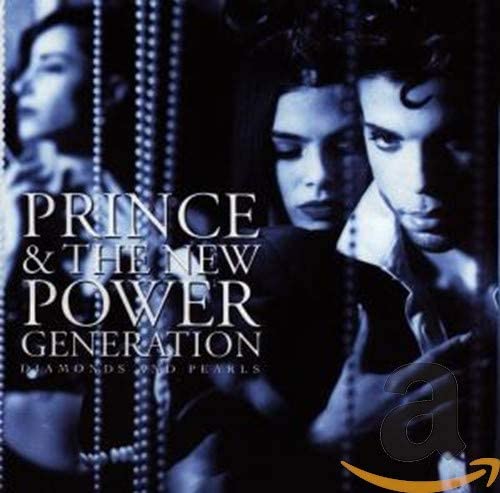I vaguely remember Prince‘s Diamonds And Pearls being released in autumn 1991 circa the start of my second year at university. Not that the term brought any of the treasures so blatantly hinted at in the album’s title. I was still coming to terms with the initial let-down that was Primal Scream’s
Screamadelica; as well as beginning a totally new epoch in my life: student house-sharing. Another over-shadowing album was, of course, Nirvana’s Nevermind. Within weeks following its release, the student bar known as ‘The Dive’ would be awash with the sartorial de-elegance of ‘grunge’.
The seemingly corkscrewed-curled Diamonds And Pearls was clearly removed from split-haired grunge or indie, and definitely would not have been on my radar at the time. The build-up to the seminal album-releases that autumn hadn’t exactly been auspicious. Loop (amicably) and Spacemen 3 (with rancour) had split up. Prince’s contemporaries, Elvis Costello and the Psychedelic Furs had released respective albums that were barrel-scraping cul-de-sacs/last roll of the dice affairs. And ‘Shiny Happy People’ was EVERYWHERE. Shoegazing did promise, but proved to be an anachronism in the perennial boy’s club of the music industry. All this going on, and I had just discovered the landlocked timeless beauty of Astral Weeks.
The 65-minute Diamonds And Pearls was the public’s choice but was inflicted with unusually somewhat indifferent reviews. It did, however, become Prince’s third bestseller behind Purple Rain and The Batman Soundtrack. His days of ‘The Revolution’ were far behind him. Now it was the turn of ‘The New Power Generation’. Like his previous albums, it begins in a token ‘epic’ fashion with ‘Thunder’ which is worthy ‘gospel-rock’ juxtaposed with eastern sounds which aimlessly drift amid contemporaneous Italian House-sounding piano. Unusually, for an album opener, it outstays its welcome. The versatile ‘Daddy Pop’ begins with a nod to Booker T with alternating lead vocals a la Sly and the Family Stone, and eventually takes on a life of its own which is both simultaneously ‘ambient’ and ‘Saturday Night’. The title track begins warmly and seductively like the Prince of yore. He sings in a deliberately deeper register and the vocals of his band-mate, Rosie Gains takes it to an earthier higher plain.
‘Cream’ occupies the same territory as mid-period T Rex, with a subtle touch of Bob Marley. Prince plucks words out of the steamy air while the call-and-response vocals of his colleagues deliciously alternate. A welcome move away from his obvious mentors. The much-maligned ‘Strolling’ – with his trademark wispy falsetto vocals – is potentially insipid but no way piffle. It is overly ‘retro’, but nothing on earth sounds like it. ‘Willing And Able’ begins with an almost Curtis Mayfield feel: claustrophobia within sheets of welcome soothing velvet. The X-rated ‘Gett Off’ is a Prince anthem trademark of overt sexuality. It is expected on a Prince album as a McCartney ballad is on a Beatles’ album. Occupying the same Mystic-Eastern territory as the Cramps’ ‘Kizmiaz’, it is brilliantly all over the place, and no doubt will appeal to both lovers and musos in the house.
‘Walk Don’t Walk’ is smattered with intense urban sounds and comes across like a raunchier Fleetwood Mac – with layered male and female vocals. Prince is conspicuous by his absence, and this is also ditto with ‘Jughead’ where rap and sex cliches abound. Like ‘Thunder’, it outstays its welcome, and it isn’t worth bothering about. Another dud is ‘Insatiable’ which is just ‘there’ as an unusual interlude. Nothing else.
Thankfully, for the latter part of the album, the pros outweigh the cons. The third salient compilation-friendly track is ‘Money Don’t Matter 2Night’ with a womb-like nostalgic vibe. A cautionary tale and very topical to boot. ‘Push’ delivers which ‘Jughead’ didn’t promise. Pallet-mixing to the extreme. The New Power Generation are most definitely Prince’s Family Stone as we are made to feel the organic presence of the members in an almost early ‘virtual reality’ way.
‘Diamonds And Pearls’ eventually concludes in a Princeian smooth hip-swaggering way with ‘Live 4 Love’ where he regains his divine control as ‘the main man’. It begins in a Kraftwerk/Psychedelic Furs way and evolves into a purist-centric rocker so beloved of Funkadelic, with the Purple One’s elevated pronounced guitar solo taking centre-stage – like a summary of the album and his career to date.
Still transcendence in unit-shifting chunks. From then on, things started to get slightly weird. But even in ‘91, still no-one could p**s on Prince’s parade. His moment was 4-ever living.




